|
|
|
Sort Order |
|
|
|
Items / Page
|
|
|
|
|
|
|
| Srl | Item |
| 1 |
ID:
156621
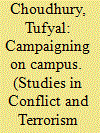

|
|
|
|
|
| Summary/Abstract |
Cooperation in counterterrorism policing increases when communities can be confident that legislation and policy is not implemented in an arbitrary or discriminatory fashion: the ability to challenge executive overstretch, abuse, or misapplication of powers is vital for maintaining procedural justice. Through examining the experiences of the Federation of Student Islamic Societies, one of the oldest British Muslim civil society organizations, we see how key structural features of the counterterrorism legal and policy framework—the wide definition of terrorism, the broad discretion in the use of stop and search powers at ports, and the expansion of Prevent into the opaque terrain of nonviolent extremism—undermine cooperation.
|
|
|
|
|
|
|
|
|
|
|
|
|
|
|
|
| 2 |
ID:
156624
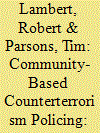

|
|
|
|
|
| Summary/Abstract |
This article presents recommendations for practitioners of community-based counterterrorism policing. The recommendations are located and explained within two broad propositions: recognize the implications and limitations of policing by consent, and respect the legitimate religious beliefs of all communities. Highlighting tensions between high and low policing and between policing and government imperatives, the article helps illustrate how different aspects of counterterrorism policy and practice may sometimes be at odds with one another. The recommendations are aimed at recognizing and, where practicable, reconciling such tensions. They arise from the authors' engagement with the issues in London and are understood to have application in other towns and cities in the United Kingdom and the West, particularly in communities and neighborhoods where Muslim citizens are the principal recipients of this form of policing.
|
|
|
|
|
|
|
|
|
|
|
|
|
|
|
|
| 3 |
ID:
156623


|
|
|
|
|
| Summary/Abstract |
This article explores the idea that nonstate actors embedded in geographically and religiously defined communities have a distinctive role to play in responding to growing terrorist recruitment efforts in Europe and North America. The resulting “community-led counterterrorism” works through at least two causal channels, which I label “ideological competition” and “ethical anchoring.” Existing counterterrorism policing strategies do not harness these mechanisms and may well undermine them. Community-led counterterrorism thus presents an untapped opportunity, even as it raises new and difficult ethical questions for both Muslim minority communities in the West, as well as liberal democracies.
|
|
|
|
|
|
|
|
|
|
|
|
|
|
|
|
| 4 |
ID:
156625


|
|
|
|
|
| Summary/Abstract |
While a considerable amount of research has been conducted on community-based initiatives aimed at preventing violence, including the role of the ex-political prisoner community in preventative and counterterrorism work, little is known about how the ex-prisoners themselves manage their identity transition between the role they occupied during the conflict and their current role in violence prevention. We argue that it is important to consider the perspective of ex-prisoners who are both architects of their own process of desistance from political violence, as well active leaders of bespoke desistance programs. While many researchers have recognized the utility of the role of ex-prisoners in violence prevention work, theoretically, the way in which ex-prisoners do violence prevention through their use of language and intergroup contact and other resources, is poorly understood. Ultimately, the aim of the article is twofold: to understand the resources (discursive or otherwise) that the community of ex-political prisoners use in their preventative work and (2) to understand how this community understand their role in desistance programs in the context of their personal involvement in violent conflict, including the ways in which participants manage their identity transition.
|
|
|
|
|
|
|
|
|
|
|
|
|
|
|
|
| 5 |
ID:
156613
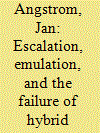

|
|
|
|
|
| Summary/Abstract |
In this article, I argue that hybridization is a contingent result of the dynamics of some conflicts but not others. In particular, faced with opponents with great power, weaker powers seek a situation of asymmetry to gain victory. Drawing on within-case analysis of the conduct of war during the past thirty years in Afghanistan, I demonstrate that what we now consider to be “hybrid” represents an important continuity and strategic option in Afghan warfare. Still, the analysis also demonstrates that choosing “hybrid” has not been a strategy that has worked. Hezb-i-Islami's rather limited attempt for conventionalization of the war against the forces of Dostum and Massoud in 1992 failed and the Taliban's more far-reaching attempt for conventionalization has so far also failed to reap strategic success. This suggests that the threat of hybrid war is inflated.
|
|
|
|
|
|
|
|
|
|
|
|
|
|
|
|
| 6 |
ID:
156619
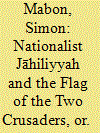

|
|
|
|
|
| Summary/Abstract |
This article argues that by understanding Islamic State of Iraq and Syria (ISIS) state-building processes we are able to understand how ISIS has developed while also developing a united citizenship body built from people in Iraq and Syria and those making hijra. The fragmentation of Iraq and Syria resulted in conditions that would prove conducive to the group's expansion and identifying these conditions is imperative to understanding Sunni extremism in the Middle East. The article argues that ISIS builds citizenship in two ways: first, by developing asabiyya—group feeling—among Sunni and second, by securitizing the Shi'a threat. Identifying and engaging with the concepts of sovereignty and citizenship helps to develop much stronger policy responses.
|
|
|
|
|
|
|
|
|
|
|
|
|
|
|
|
| 7 |
ID:
156622
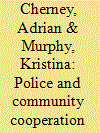

|
|
|
|
|
| Summary/Abstract |
Effectively engaging the Muslim community is a challenge for police given many Muslims feel unfairly targeted by counterterrorism policies and laws because of their faith. This article explores how such perceptions influence the willingness of Muslims to voluntarily cooperate in counterterrorism efforts, drawing on data collected from Muslims living in Australia. We test whether procedural justice policing can help buffer this perception of being targeted as a security threat and whether it can enhance Muslims' willingness to cooperate with police. Efforts by the Australian Federal Police to engage Muslim communities in Australia are also examined. The implications of the results for community-based approaches to counterterrorism are discussed.
|
|
|
|
|
|
|
|
|
|
|
|
|
|
|
|
| 8 |
ID:
156614


|
|
|
|
|
| Summary/Abstract |
The quick unraveling of authoritarian systems specifically designed to bear social pressure during revolutions is puzzling. Building on the 2011 Tunisian revolution, this article analyzes the collapse of the police apparatus during the 2011 revolution. In line with Way and Levitsky's study of authoritarian collapse, this article shows that the low cohesion and low scope of the security forces is one of the main factors explaining the rapid collapse of one of the Arab world's seemingly most solid repressive systems. At the theoretical level, this article will demonstrate that preference falsification is a double-edged sword. On the one hand, it can nourish authoritarian resilience. On the other, it can also weaken repressive regimes by making core members of the regime overestimate the loyalty of the low-ranking members of the security apparatus.
|
|
|
|
|
|
|
|
|
|
|
|
|
|
|
|
| 9 |
ID:
156617


|
|
|
|
|
| Summary/Abstract |
As the United Kingdom has placed some of its Prevent strategy on a statutory footing and is proposing to introduce a Counter-Extremism Bill, this article argues that a legal definition of extremism must be carefully drafted to provide legal certainty. The main recommendation is that all forms of violent and nonviolent extremism comes under the definition, ensuring it is differentiated from activism. Activism may hold radical views counter to the mainstream opinion, but it is required in liberal democracies as it encourages healthy debate and can prevent the policing of thought in any government strategy or legislation.
|
|
|
|
|
|
|
|
|
|
|
|
|
|
|
|
| 10 |
ID:
156615


|
|
|
|
|
| Summary/Abstract |
The relationship between armed rebels and local civilians is among the least understood aspects of insurgency. This article posits a novel theory, the rebels' resource curse, to argue that the interaction between rebel groups and local communities can be traced to the availability of revenue-generating resources. The theory is developed using a case study comparison approach to critically analyze how access to revenue-generating resources among the Naxalites in India and the Fuerzas Armadas Revolucionarias de Colombia (Revolutionary Armed Forces of Colombia) in Colombia affect these insurgent-civilian interactions. The theory proposes that insurgents face a resource curse similar to that faced by states. Rather than resource wealth contributing to greater social engagement and fruitful insurgent–civilian interactions, it appears to precipitate isolationist, and even exploitative and violent relations between insurgents and local civilian populations. Conversely, resource scarcity predicts a greater degree of social integration and cohesion between civilians and insurgents. The framework of the rebels' resource curse can also be applied productively to other insurgent groups, enhancing our understanding of the social realities of insurgency.
|
|
|
|
|
|
|
|
|
|
|
|
|
|
|
|
| 11 |
ID:
156620


|
|
|
|
|
| Summary/Abstract |
The role of communities in preventing or responding to terrorism and political violence is increasingly finding prominence within government strategies, nationally and internationally. At the same time, implementation of effective community-based partnerships has been nominal. Adding additional complexity to this problem are policies such as Prevent in Britain, which was arguably developed with good intentions but has received significant and sustained criticism by the very communities it sought to engage with. The result has been ongoing discussions within community practice and research arenas associated with radicalization, extremism, and terrorism, as to the role, if any, that communities might play in the counterterrorism environment. This article explores that environment and highlights some of the community-based perceptions and initiatives that prevail in the United Kingdom. In particular, innovations around the development of psychotherapeutic frameworks of understanding in relation to counterterrorism are discussed, alongside the role of connectors.
|
|
|
|
|
|
|
|
|
|
|
|
|
|
|
|
| 12 |
ID:
156626


|
|
|
|
|
| Summary/Abstract |
A growing number of British youth are traveling to join the Islamic State of Iraq and Syria and participate in the conflict. In this modern iteration of “foreign fighters” community driven countering violent extremism (CVE) efforts remain necessary as the age of travelers to the conflict zone from geographical hotspots in the United Kingdom decreases, and numbers of those going increases. It is their immediate environments—their communities—which can help to prevent violent radicalization and subsequent travel to conflict. Weaknesses in the government's approaches to community engagement can lessen the efficacy of community CVE capacity. This article aims to highlight some of these weaker U.K. government approaches while suggesting ways to improve community engagement that can strengthen CVE efforts.
|
|
|
|
|
|
|
|
|
|
|
|
|
|
|
|
| 13 |
ID:
156612


|
|
|
|
|
| Summary/Abstract |
U.S. counterterrorism (CT) forces that deployed to Iraq in 2003 as Task Force 714 (TF 714) faced an ugly surprise. Tasked to dismantle the al-Qaeda in Iraq (AQI) dominated insurgency, the organization could not achieve that mission. General Stanley McChrystal, who commanded TF 714 concluded, “we were losing to an enemy … we should have dominated.” But TF 714 transformed in the midst of war and during 2006-2009 was able to largely dismantle AQI's clandestine networks to a degree that they could no longer function in a cohesive manner. By developing the capacity to operate inside those networks, TF 714 was able, in the words of General McChrystal, to “claw the guts out of AQI.” This transformation runs counter to what organizational experts identify as barriers inhibiting militaries from learning, innovating, and changing, especially in wartime. To decipher the puzzle of how TF 714 overcame these barriers, two questions are addressed in this study: 1) How did TF 714 transform from a specialized and compartmented unit customized for executing infrequent CT missions in peacetime to a wartime industrial-strength CT machine that by 2009 dismantled AQI's networks that operated across Iraq; and 2) Why was TF 714 able to achieve this remarkable transformation?
|
|
|
|
|
|
|
|
|
|
|
|
|
|
|
|
| 14 |
ID:
156618


|
|
|
|
|
| Summary/Abstract |
Scholarship explores the impact of human rights abuse and state repression on terrorism. Heretofore, scholarship has ignored the impact of government-sponsored killings on domestic terrorism. This article proposes that mass killings create a focal point for terrorist mobilization. The vendetta agenda fuels violence by animating retributory violence. Additionally, mass atrocities create a permissive environment for violent nonstate activity. A spiral of violence ensues whereby groups resort to terrorism. Utilizing data from the Global Terrorism Database, 1971–2011, the study shows that mass killings significantly increase domestic terrorism. It contributes to emerging scholarship examining how state policies influence terrorist activity.
|
|
|
|
|
|
|
|
|
|
|
|
|
|
|
|
| 15 |
ID:
156616
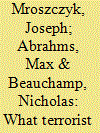

|
|
|
|
|
| Summary/Abstract |
In recent years, a growing body of empirical research suggests that indiscriminate violence against civilian targets tends to carry substantial political risks compared to more selective violence against military targets. To better understand why terrorist groups sometimes attack politically suboptimal targets, scholars are increasingly adopting a principal-agent framework where the leaders of terrorist groups are understood as principals and lower level members as agents. According to this framework, terrorist leaders are thought to behave as essentially rational political actors, whereas lower level members are believed to harbor stronger non-political incentives for harming civilians, often in defiance of leadership preferences. We test this proposition with an original content analysis of terrorist propaganda videos. Consistent with the principal–agent framework, our analysis demonstrates statistically that terrorist leaders tend to favor significantly less indiscriminate violence than their operatives actually commit, providing unprecedented insight into the incentive structure of terrorist leaders relative to the rank-and-file.
|
|
|
|
|
|
|
|
|
|
|
|
|
|
|
|
|
|
|
|
|